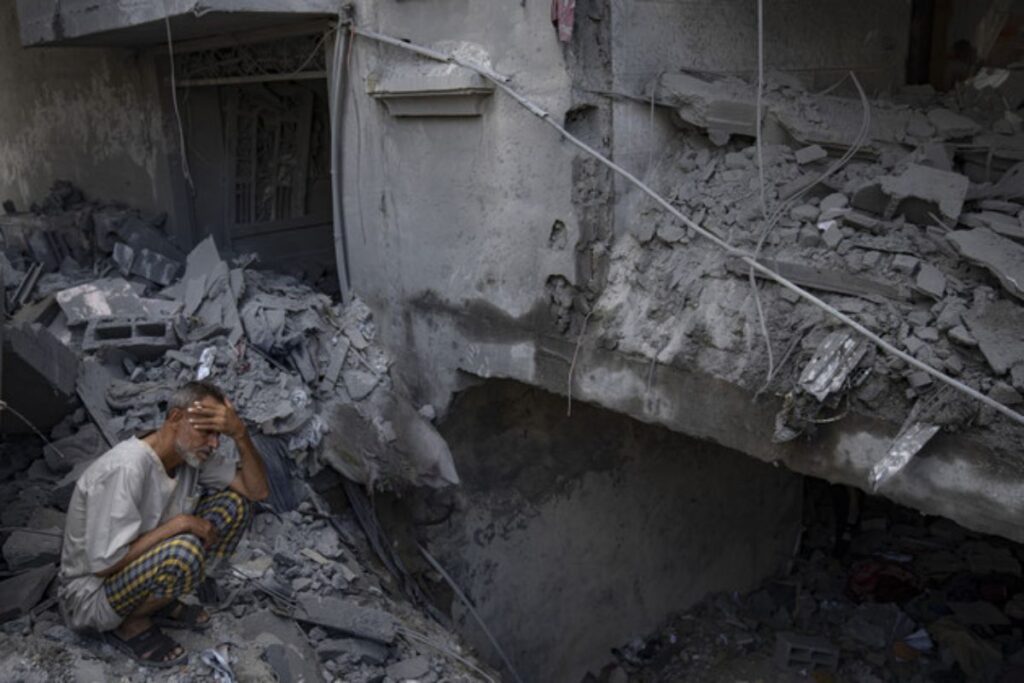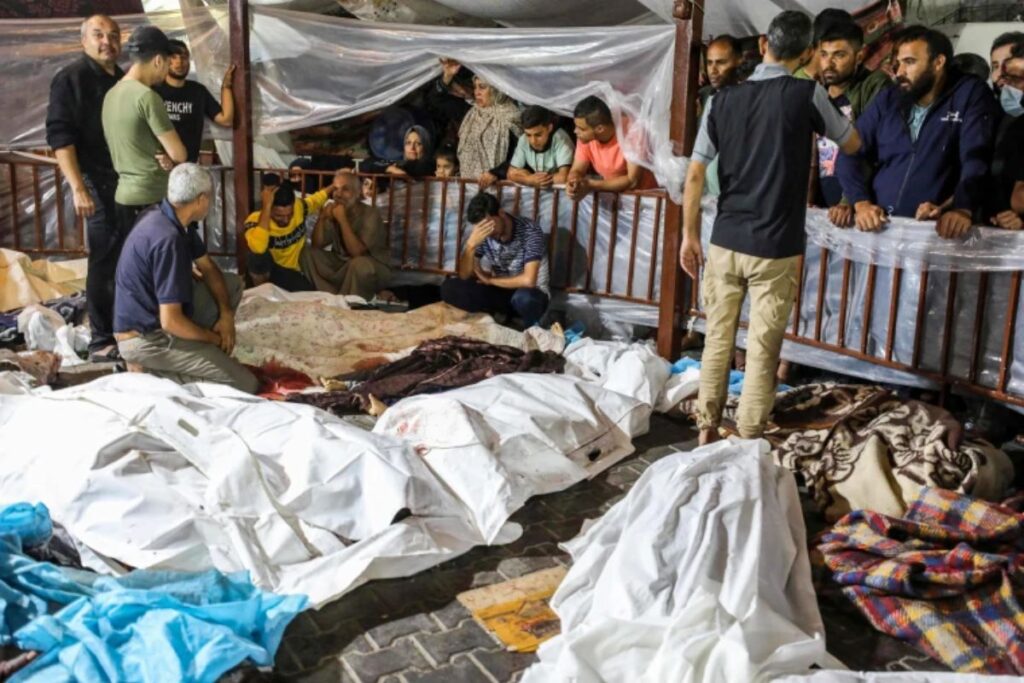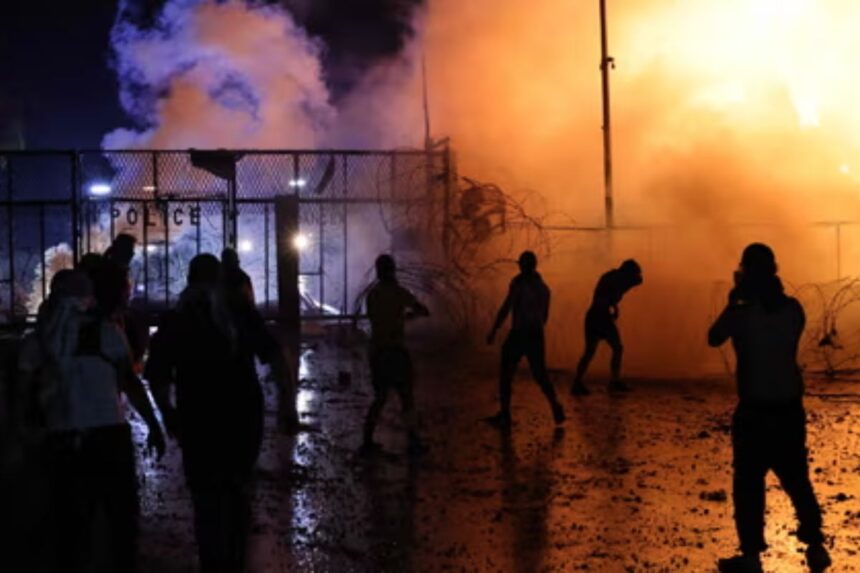On October 18th, a devastating explosion at gaza occurred at the Al-Ahli al-Arabi hospital, resulting in a tragic loss of life. Initial reports suggest hundreds of casualties due to the explosion.
Origin of the Blast: Contested Perspectives
Palestinian representatives attribute the blast to an Israeli airstrike. In contrast, Israel asserts it was the result of a failed rocket launch by the Palestinian Islamic Jihad group, which refutes the claim.
Impact on Biden’s Diplomatic Efforts
U.S. President Joe Biden’s diplomatic visit to the region aimed to bring peace and display support for Israel, especially after the violence on October 7th where Hamas militants caused significant Israeli casualties. However, the hospital explosion significantly impacted these efforts.

Summit Cancellation
Following the explosion, a pivotal summit scheduled in Amman with leaders from Jordan, Egypt, and the Palestinian Authority was called off. The summit aimed to provide aid to Gaza and prevent further conflict escalation.
On-Site Desolation
The aftermath of the explosion was catastrophic. Search teams looked amidst the wreckage for survivors. Estimates regarding the death toll vary, with numbers ranging from 300 to 500 casualties. Witness accounts from inside the hospital described harrowing scenes, including severely damaged vehicles.
Contention Over Responsibility
Israel provided drone footage suggesting they were not behind the explosion due to the absence of missile or bomb impact craters. They also shared purported audio evidence of misfired rockets. However, many Palestinians believe it was an Israeli-initiated attack on the hospital, a refuge for many affected by the conflict.
Regional Outrage For The Explosion At Gaza
The incident elicited widespread anger throughout the Middle East. Protests broke out in various locations, including near Israel’s embassies in Turkey and Jordan, and close to the U.S. embassy in Lebanon.

International Reactions
Numerous countries and global officials decried the explosion, often refraining from pinpointing blame. The U.S. continued to support Israel, but President Biden faced mounting pressure to ensure civilian relief in Gaza.
Gaza’s Dire Situation
The Gaza Strip, housing over two million Palestinians, currently faces severe shortages in essential supplies. Although the Israeli military promised a “humanitarian zone” for aid delivery, the logistics remain unclear. Meanwhile, trucks with supplies await entry into Gaza, but border complications and concerns over aid distribution hinder their progress.
The underlying causes of such tragic incidents in Gaza can be traced back to longstanding geopolitical tensions in the region. Israel and Palestine have been embroiled in a deeply rooted conflict for decades, centered on territorial disputes, religious significance, and historical grievances. Multiple attempts at peace negotiations have either faltered or been short-lived, leaving the populace vulnerable to cycles of violence. The hospital explosion serves as a grim reminder of the volatility of the region and the dire need for a lasting peace solution.
Furthermore, the broader international community’s involvement and interests in the region have often added layers of complexity to the Israel-Palestine situation. Superpowers, neighboring Arab nations, and global organizations have tried to broker peace or have taken sides, leading to a web of alliances and animosities. This dynamic, coupled with the area’s rich historical and religious significance, has made establishing lasting resolutions challenging. Incidents like the Gaza hospital explosion underscore the fragility of peace efforts and the importance of genuine, collaborative interventions.
Moreover, the socio-economic disparities and restricted access to resources in places like Gaza intensify the already volatile situation. Prolonged blockades, limitations on trade and movement, and intermittent conflict have stifled development and rendered the area dependent on external aid. The populace grapples daily with the consequences: unemployment, lack of access to basic services, and deteriorating infrastructure. Such dire circumstances often serve as fertile grounds for radicalization and heighten grievances, feeding a perpetual cycle of unrest and violence. Events like the hospital explosion, while deeply tragic, are manifestations of these broader, systemic challenges facing the region.
Biden’s Stance
During his visit, President Biden was expected to address these pressing issues with Israeli leaders. White House national security spokesperson, John Kirby, mentioned that Biden would be direct in his inquiries.
Contributors: Nidal Mughrabi, Steve Holland, and the Jerusalem Bureau. Article adapted by decolonizd from original content by Peter Graff, edited by Gareth Jones.


















